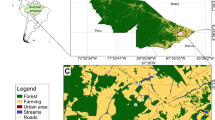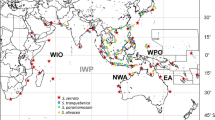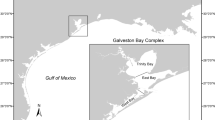Abstract
Perturbations to the density of a species can be propagated to distant members of a food web via shifts in the density or the traits (i.e. behavior) of intermediary species. Predators with differing foraging modes may have different effects on prey behavior, and these effects may be transmitted differently through food webs. Here we test the hypothesis that shifts in the type of predator present in a food web indirectly affect the prey's resource independent of changes in the density of prey. We assessed the importance of predator identity in mediating the grazing effects of the freshwater snail Physa integra on its periphyton resources using field and mesocosm studies. Field observations showed that Physa used covered habitats more in ponds containing fish than in ponds containing crayfish or no predators at all. A field experiment confirmed that snail behavior depended on predator identity. Physa placed near caged pumpkinseed sunfish (Lepomis gibbosus) selected covered habitats, but Physa placed near caged crayfish (Orconectes rusticus) moved to the surface of the water. The effects of predator identity on periphtyon were then examined in a mesocosm experiment, using caged predators. Habitat use of Physa was similar to their habitat use in the field experiment. In the presence of caged sunfish, periphyton standing crop in covered habitats was reduced to 34% of the standing crop in the presence of crayfish. In contrast, periphyton in near-surface habitats was 110% higher in the presence of fish than in the presence of crayfish. Thus, the effects of predator identity on Physa behavior cascaded through the food web to affect the abundance and spatial distribution of periphyton.
Similar content being viewed by others
Author information
Authors and Affiliations
Additional information
Electronic Publication
Rights and permissions
About this article
Cite this article
Bernot, R.J., Turner, A.M. Predator identity and trait-mediated indirect effects in a littoral food web. Oecologia 129, 139–146 (2001). https://doi.org/10.1007/s004420100705
Received:
Accepted:
Published:
Issue Date:
DOI: https://doi.org/10.1007/s004420100705




